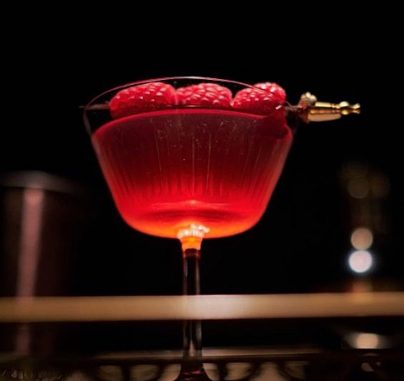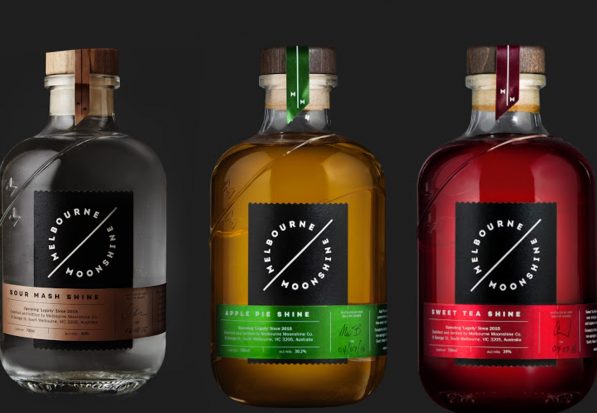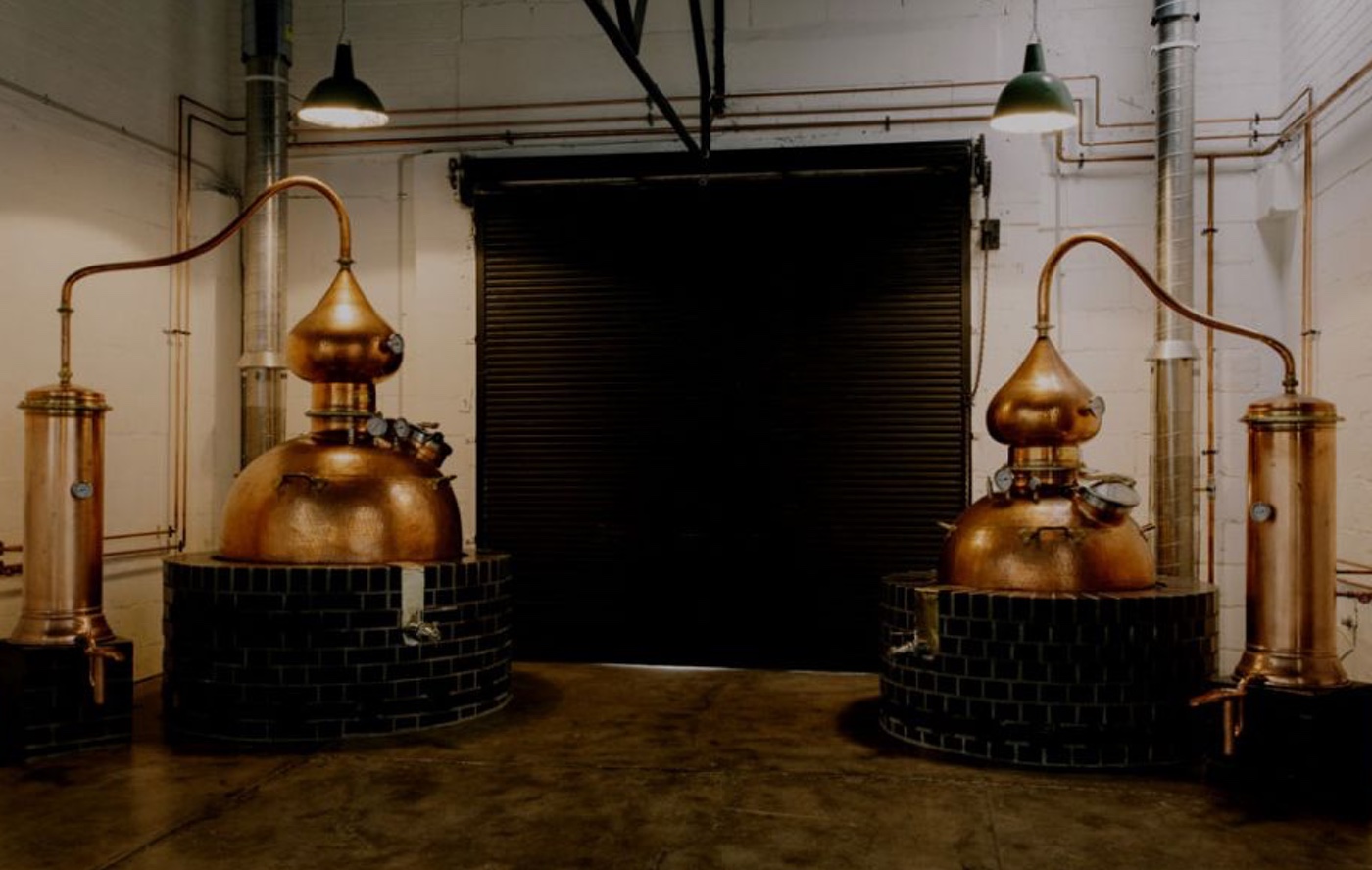You may have heard the term moonshine before to describe illegal liquor or the practice of prohibition-era style, backyard distilling. But the term and the spirit have come a long way.
Over the past few years, the production of moonshine or white whiskey has not only become more accepted, but there are also a host of distillers who is reinventing the genre.
One such distiller is Ben Bowles of Melbourne Moonshine, who spent the last few years showing locals exactly what white lightning can be. To find out more we talk to Ben about producing a spirit without age, reinventing the category and exactly how this liquor should be used.
You may have heard the term moonshine before to describe illegal liquor or the practice of prohibition-era style, backyard distilling. But the term and the spirit have come a long way. Over the past few years, the production of moonshine or white whiskey has not only become more accepted, but there are also a host of distillers who are reinventing the genre. One such distiller is Ben Bowles of Melbourne Moonshine, who spent the last few years showing locals exactly what white lightning can be. To find out more we talked to Ben about producing a spirit without age, reinventing the category and exactly how this liquor should be used.
Thanks for joining us, Ben.
Thank you for having me.
Now moonshine is typically very American. Why did you choose to distill that here in Australia?
Yeah, so I'm originally from the US and grew up in the Southeast, in South Carolina. And that historically is an area where moonshine is produced. So it's what I grew up around have a family tradition, my family certainly has a history of making moonshine. So for me, it was what I knew, what I grew up around. And so when I moved to Australia, I started making it in the garage with my co-founder Andrew Fitzgerald. And for us it was that journey of me teaching him how to make it and then teaching him the history because there is such a rich cultural history around moonshine. And from there we eventually got to the point where it was, should we do this as an actual enterprise? So we decided to actually put it on the market and try to make a real go of it.
Tell us a little bit more about your family history with moonshine. Did they produce it commercially or was it just something that was done in the backyard and given to family friends?
It was not a commercial operation. I mean, I guess we have family records of great, great, great grandparents that did make moonshine and produce on home distillation units. I have an ancestor from 1800, who actually left his still in his will to his son. And he was a first-generation Irish immigrant, who obviously brought that with him when he came across. And that's been handed down through generations and it was never that I know of. It was never, commercial operational or even illicitly to that size where they sold it. But it's always just a family tradition to make moonshine as a family. Just to keep that family tradition going, I guess. So it's just that the culture of the area as well, it's just kind of what people in the area have always done.
Now, what about moonshine made you think that it would work well in an Australian market?
It's a very different spirit and again, it's that connection back to the history of what it is. Moonshine, the real terminology of moonshine comes across from one, people obviously trying to evade paying taxes, but really from the prohibition era. The style of moonshine we make, the sour mash original moonshine, it's really what you'd expect would have been made around the prohibition era. When you had moonshiners making it in the Hills of Virginia and moving it up into Chicago and New York areas. To really able to ... we're able to extend that and offer that locally because it's just an interesting spirit and being able to share that in Australia, where you don't have that rich tradition of moonshine production here.
Now, if people have never tasted moonshine before, how would you describe it?
The style that we make is more of a subtle spirit. So it has more of a creamy and a sweet note from it, not overly harsh tastes or notes. It's very, very approachable. And again, that's probably more to the way we actually produce it, because you have to be very gentle in production. Just to make sure that you don't get those really harsh characteristics in it.
Now, if someone's a whiskey drinker when they approach moonshine, they're not of course getting the Oak characteristics that they might be used to. How would they react, do you think, to what you're producing?
I mean, it's obviously, from the same base. So if you're a whiskey drinker and you have tasted new make, there probably a lot of similarities to new make whiskey. However, a new make whiskey, it's probably a little bit more pungent. Got a lot more grain flavour to it. With the moonshine, because we're not going to age it, we know that when we make it. It has to be approachable and drinkable off the still, so there's no way to ... there's no mellowing of the spirit in oak, here's no time for those really harsh chemicals to break down. If it does come off harsh, you're not going to be able to have that or let that mellow out over time. But other than that, I would suggest that you still have the grain flavour, at least nuances of those grain flavours, particularly from the corn, so we make our moonshine from corn or is it corn base.
Those characteristics of the corn do come through, which is that vague and that creaminess and the sweetness that you expect in corn. But then it starts to diverge because you're not going to get those tannins or the vanillans or the sweetness from the sugars that you do get in whiskey from the oak because again, it's an un-aged product.
Does that mean that making moonshine is actually more difficult than making an aged whiskey?
I would suggest it is because again, you can't hide those flavours. There's no time for it to mellow, there's no intermingling with the components of wood. So the day it comes off the still, it has to taste good because that's exactly what's go into the bottle.
You've recently released a second brand, Gospel Whiskey. What has developing that changed the way that you make moonshine or alternatively has making the moonshine, made the Gospel Whiskey a better product?
I think ... we haven't changed the way we actually make our moonshine because we're putting up, I guess our whiskey. So the Gospel is a rye whiskey. But what is done I guess is, let us focus a little bit more on that, on the whiskey side or the approach to whiskey. And through that will probably, the moonshine itself, will probably start leaning more towards just the flavoured products of the flavoured skews. We'll probably stop making or at least cutback production of I guess the original style of moonshine. Again, because it is so close to whiskey, that way it really allows us to concentrate on the Gospel brand and the rye whiskey that we are making. So we'll concentrate on rye whiskey in the Gospel and we'll concentrate on flavoured products in the moonshine.
Tell us a little bit more about the flavoured products that you already have with the moonshine and maybe a little bit about what sort of flavours you would like to explore in the future.
Yeah, sure. So with flavour products for moonshine or probably those more historical products that ... flavours that you do expect with moonshine. So apple pie is probably the most famous, very traditional flavour. And then we also have the sweet tea. So in the South of the US, sweet tea is pretty common thing. If you go to anybody's house, they've got a jug of sweet tea in the refrigerator, not necessarily alcoholic, but certainly is something that's consumed at every meal, sometimes even breakfast. So it's one of the most common things that they drink in the US and the Southeast. So intermingling that into moonshine just made sense for us as well. And we do have a lightly aged version of the moonshine. Again, not a whiskey, but it is a barrel-aged version, a single cask that we have as well. And those are really the three predominant ones that we have.
We have done other flavours before, cascara flavour, which is the coffee, the cherry coffee husk around the coffee bean. We used to make a flavoured version with that. And then we've done other projects like a bloody Mary, a moonshine flavour as well. But future ones will probably, maybe play around with blueberry or even pineapple. We haven't said what that next one will be, but we are definitely interested in expanding that flavoured range.
Now if someone is drinking flavoured moonshine for the first time, how are they going to find a different from say, a flavoured vodka.
Really a great question, because vodka is a blank palette. It's very neutral and it's supposed to be by nature just alcohol, just pure ethanol. It is a completely blank canvas. And with moonshine, you do have those on the line complexities, you don't want it to be a purely neutral spirit. You do want that grain influence and that creaminess and the sweetness. And because of that, it really gives a really good base to add flavours and layers on top of that. And put that in perspective, we have tried using our neutral spirit so basically our vodka to use that to make flavoured spirits or flavoured versions of the moonshine. But it really it's just is one dimensional because you only get the flavour, you don't get that really the complexity that you get when you use moonshine as the base. So it really lets you start with a better base and better base spirit to start layering the flavours on top.
So is it done in an infusion fashion or ...?
Different styles. It depends, it really depends on what the flavour is and what the base is, for our apple pie. So we actually use apple juice, which was for, say for our sweet tea, we actually use the teabags or a massive giant teabag infusion into the moonshine. So again, it really just depends on the style or flavour or what base or what flavouring agent we're going to be using in the moonshine.
That brings up the interesting topic of the still set up.
So we use a double distillation method, to still set up to make our moonshine. It's really a replicates what moonshine in the States would have been made on. I mean, typically they do a single run, but it's still a double distillation method because moonshine still has what's called a Thumper off the side of the pot. So it goes through the pot, the still enters that into your Thumper and then distils out of that, by way of the steam that's transferred into your Thumper, into a final collection vessel. What we use is a separate two to two still set up. So we collect the low runs off of the initial run and then we'll put that into our spirit still and then run that through again. So very much the same style of production that you expect in an aged whiskey setup.
Is there a difference between the moonshine you're producing and what can currently be found in the US right now?
Our moonshine is based on really the traditional style made in the South East and I expect as that many producers of moonshine now in the US, that I'm certain there are some that are making in the very traditional style that we make. I know I've tasted quite a few that probably I would suggest use industrial neutral grain spirit to produce the moonshine. So I'd say you can find both. However, what we make is that very traditional style, so we really like to stick to the historic methods when we're making our moonshine.
Would you say that flavour is really the way that innovation comes into moonshine?
Flavour really is where I'd say the most innovation is because there's probably only so far you can take moonshine itself. I mean, you can certainly use different bases and by the true definition of moonshine, it is the distillation of a starch or sugar base. So moonshine can be made from anything, can be made from any storage of sugar substance that you can find. I mean, there're stories of, particularly back in the days, when farmers would have a crop of say apples or cherries that would have been damaged by hail and they wouldn't have been able to sell it at the market. So they'd sell them to the local moonshiner and they would turn it into alcohol. It's a way to still use the goods that may not be pretty, but still certainly have a lot of value.
So again, we use corn as our base and that's a very historic and traditional style, but there's nothing to say, we couldn't make a raw based moonshine, and we'd never do that because we really want to be true to the other brand, the Gospel, we really want to be true to the whiskey that we're making there. But certainly, and there's moonshine out of Tasmania, they use malt or use barley bay. So there can be innovation on that side, but again, you're going to be limited to effectively new make whiskey. The innovation that I think is really, you really see happening in the moonshine world will be through flavouring.
Would you ever think of experimenting with apples or damaged fruits as you go forward?
Yeah. We have. We've looked at doing that. I mean it really is more, will be based on the opportunity at hand. I don't think it will be something we necessarily go out and search for, but if the opportunity presents itself, if there's somebody that does have some fruit or grain, we might look at using that in the moonshine. There's no, again, it still has a lot of value as the starch or the sugar base and even I think it speaks to lot of the day and age that we live in, that every Apple has to be exactly perfect to go on the shelf. And I think that is probably a bit silly. There's so much waste out there that this perfectly good fruits that would get thrown away that you could certainly be able to turn into some pretty delicious alcohol. So I think that if the possibility presents itself, we'll certainly look at it.
Now, you guys have been going for five years down in Melbourne. Has it been difficult to get consumers away from their preconceived notions of what moonshine is?
Yeah, it's definitely an educational experience to get people to get over the stigma of moonshine. It certainly does have those qualities about it from history that people think it's one, that's made in the bathtub or it's going to make them go blind. And that obviously comes from the history of moonshine, where people have added in chemicals just to make a few more dollars and to sell it. But moonshine and through any distillation, it's extremely hard to produce anything that's actually going to hurt, you other than ethanol poisoning. So alcohol poison that you can get by drinking just too much of it. It's not dangerous in itself other than ethanol poisoning. But it does have that stigma and that is a little bit to overcome.
But I think what we found is that once people actually try it, they're quite surprised that it's actually delicious and much more willing to try again or even pass it on to their friends. And it does become that little bit of a curiosity to, "Oh, wow, this moonshine, it could taste like this," and does become a talking point. So once we're able to get over that initial conversation about, "Is it going to kill me or is it going to make me go blind," I think it's a much easier conversation.
Now, why should people buy a moonshine compared to buying any other spirit?
It's the experience again, and it's a connection to the history of what moonshine is. It's that reliving the times when people were drinking this in a speakeasy, in the underground basement bar in New York or Chicago. Really what we're trying to reproduce is that same spirit and that connection to it and the connection to history. There's not a lot of people who particularly that make this style of moonshine, certainly not in Australia. So anytime you would pick up a glass of moonshine and taste it, you're really basically drinking that same spirit that they would have consumed back in the heyday of the prohibition era.
And in terms of flavour, what does it give that perhaps other spirits don't?
It depends on if you're drinking the sour mash or the original moonshine or the flavoured. But it's just another interesting spirit. I mean, why does anybody drink tequila over whiskey or gin over vodka? It's just an experience. It's to be able to try something new and different, it's not something you're going to find anywhere. It's certainly a spirit of its own.
Now people are experimenting with it at home. Should they use it like they would use a whiskey or should they perhaps use it like they would use a clear spirit, like vodka or gin?
I would say it probably lends itself, obviously, it is a clear spirit, so it lends itself a bit more toward being used like a clear spirit. And now I would liken it more to tequila or maybe even a genever then a whiskey. But it can be used in whiskey-based cocktails as well. A particularly find it goes really well in an old fashioned. But that's the great thing about moonshine spirits in general is, you play around with them and you can find some really, really interesting uses for things you wouldn't expect would have worked. I think that it lends itself to mixing pretty much across the board, but that's the fun part of experimenting with it.
If people are experimenting, what flavours work well? If you were looking at the sweet tea or the apple pie, to heighten the cocktail experience?
I think ... listen, those are both very big, big flavours the tea and the apple pie. And typically when I would use those at home, so apple pie goes really well with ginger beer and the sweet tea is amazing with a lemon squash or a lemonade. They're just very, very ... they're already big bold flavours that need something quite bright. But again, they do mix well. If you're mixing down into a very, I guess a nice cocktail they can work well. It just needs a bit more exploration around those, again, the apple pie goes great in an old fashioned as well. So, it really just depends on how you want to mix them. But typically personally I prefer just a simple soda with those two flavours. With the moonshine, the sour mash really goes well with citrus, lemonade particularly. We have a bootlegger lemonade that we'd like to make with it, which is just a shot of moonshine and then topped up with lemonade and a sprig of mint. It's delicious.
What has the reaction of bartenders been to the spirit?
They've been really great. We've had a really good reception with bartenders. Again, it's that bartenders love new spirits and new things to play around with, because it is so different, they really, really like to get the hands-on it and just experiment. Particularly, Melbourne bartenders is such a rich culture around mixology and anything new that you get their hands on that they're just drawn towards. I've been really fortunate at the number of venues, particularly, really high-quality vendors that have taken it on and experimented.
What are the more unusual ways that you've seen bars actually use the spirit?
I think, for the most part, they really liked to substitute them into, probably the more classic. But I'll tell you one that really was quite amazing was, Dave Kerr at the Beaufort when he ran that, was he took a sour mash and he made this Solera system out of coconuts and farmed them together and filled it with that. And so he made a Solera age moonshine in coconut milk. It was absolutely amazing. It was really incredible.
I assumed that the Melbourne Moonshine is widely available in Australia.
Yeah, mostly independence at this point. We obviously have an online shop ourselves through the website, but a lot of independents. And now we've picked up distribution through Vanguard Luxury Brands, particularly for our apple pie, which has been great. That just helps get it out there even further. So it is still growing. And we've been fortunate enough from July, should be in BWS as well. So really, really fortunate and happy to see it going there. But really, really good independents at the moment. Blackhearts & Sparrows, the Wine Republic and the single shop independence main street bottle shops, are the most likely place to find it at the moment.
Is this a product that you would consider exporting?
Yeah. In fact, we do export at the moment, particularly to Singapore and Southeast Asia. And we do have some product in New Zealand at the moment. Listen, beyond that, there is an opportunity to export. We probably aren't going to push real hard to export obviously at this point with the things the way they are.
We're not going to take that off the table. So it's always looking for opportunities to get it to new places. I guess we did look specifically at exporting to do the US a few years back and there're arguments take both sides to export back to the States. Why would you do that? Because it is so much moonshine already there. But, it's a product they know and it's a product they understand and it is a little bit of a point of difference. Because the moonshine made in Australia going back to the State certainly is a little bit different. So we didn't ultimately push forward to that but there's no reason we won't look at that again in the future. For now, we're pretty settled just supplying the local market and the current markets that we are exporting to.
f people want more information about the brand, they can, of course, go to your website, which is Melbournemoonshine.com. Thank you for joining us, Ben.
No, that's great. Thanks so much for your time and appreciate you having me.
Cheers.









